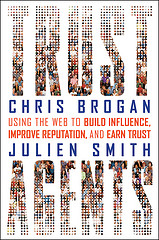In our pursuit of helping nonprofits discover the very best fundraising, social media marketing and branding ideas we’re interviewing some of the great thinkers and “doers” out there.  Today we’re totally pumped that we have an interview with Chris Brogan. Chris Brogan and Julien Smith have a new book out, “Trust Agents.”
Today we’re totally pumped that we have an interview with Chris Brogan. Chris Brogan and Julien Smith have a new book out, “Trust Agents.”
Trust Agents is an insightful analysis of how “trust” has become a key currency and the critical ingredient in how marketing and commerce works today. We asked Chris to talk a little bit about how the principles he describes could apply to a nonprofit.
Oneicity: Chris, first start by describing who a trust agent is.
 Chris Brogan: A trust agent is a person who’s learned how to be human at a distance using online tools, and someone who believes that relationships are at the core of all interactions.
Chris Brogan: A trust agent is a person who’s learned how to be human at a distance using online tools, and someone who believes that relationships are at the core of all interactions.
Oneicity: The relationship focus sounds a lot like Oneicity’s mantra, “it’s all about relationships.” In the book, it seemed to us that Trust Agents are always people not organizations. So, how does an organization like a rescue mission or a domestic violence shelter use the concepts you write about in Trust Agents?
CB: Trust agents are people, but they can organize for causes. The next-to-last chapter, Build Armies, addresses this. We feel that a rescue mission or a domestic violence shelter needs a natural connector (Agent Zero), needs a way to build rapport (One of Us), needs to understand how to leverage donations and support into larger opportunities (the Archimedes Effect) and to stand out from the other causes seeking people’s attention (Make Your Own Game). We think that causes are a great place for Trust Agents to operate.
Oneicity: What you say about giving to others first is powerful (and something we at Oneicity believe whole-heartedly). In thinking about a nonprofit, how do you see this working? Could they serve and connect with their donors before asking for donations?
CB: Donor fatigue doesn’t start at the request for money. Organizations that thrive on donations are often so cause-centric that they forget the polite human business of asking the people who donate what’s important in their lives, and how they might give back. Heck, just asking what people are interested in and responding in a human fashion takes some edge off from the whole donor experience.
Oneicity: You’re so right. In the One of Us chapter, you give a great sidebar on “Signals of Trust.” The key items you list are: Design, Longevity, Volume of Productivity, Number of Comments, Number/Quality of Links, Domain name, etc. Many npos (small and otherwise) struggle to have enough resources to do these things well. In thinking about connecting with donors and potential donors to an organization, what would be most important for an organization to do?
CB: The most important things to do are: have a home base where people know exactly what you’re asking for and exactly what it’s going to do for people, in a VERY SUCCINCT way. We tend to put up way too much copy. Make it brief, impactful, supported with a few pictures, and call that your baseline site.
If you can add a blog, it gives people the sense that you’re interested in a conversation. Barring that, be very active on other people’s blogs. Comment often. Share information. And give people links back to your home base, should they want to know more.
The most important thing isn’t the tech as much as it’s the effort to connect, connect, connect. We feel that having a website (most often a blog), people are invited into a warm space where they can get to know you on their way to building a trusted relationship with you.
Oneicity: Your chapter on “Building an Army” was tailor-made for what npos are trying to do but typically aren’t managing well. What tools would you recommend a small nonprofit use when resources are tight (both time and money)? In other words, where should they start and concentrate?
CB: Build Armies is a chapter about connecting with people and building what amounts to disciples. There are so many free tools to build networks around. Ning.com could offer you a free social network. Google Docs allows you to keep simple databases of your user base. Gmail gives everyone free email accounts and chat apps. Twitter is free.
Money is rarely the issue. Time, on the other hand, matters most. Build Armies attempts to point out that people can’t just do it alone. Teaching others to fish is what wins in the longer run.
Oneicity: Great answer which takes us to our bonus personal question: You talk in the chapter on Human Artist about unanswered email. You give three rules: Respond to everything promptly; Everything is a test; Don’t take forever. We know people who struggle with this all the time and aren’t nearly as busy as you are. What kind of tools or systems do you personally use to stay up with the “tidal wave of people” that are coming your way?
CB: I fail this test all the time. I’m failing it now. In 2 days, I’ve got over 300 unread/unanswered emails. I receive about 590 a day on average, and am trying to manage what amounts to a losing battle.
I use Batchbook.com to keep myself up to date with my contact list overall. I use tools like Twitter and Facebook to keep a warm pulse alive in between work. I use Awayfind.com on my more general email account as an autoresponder.
And in general, that’s how I’m managing things. It’s not easy. I’m still learning every day.
Oneicity: Thanks Chris for the great book and for taking time to share your thoughts.
The word on the street about Chris Brogan is that he’s super sharp but still a humble guy. From everything we know and from our interactions with him, that reputation is dead on. You can read Chris’ blog here: Chrisbrogan.com has been on our read everyday list since the beginning of 2008. He has something to say and we pay attention to him. You can follow Chris on Twitter at @chrisbrogan.
His co-author, Julien Smith blogs at In Over Your Head. and naturally he’s on Twitter, too. Follow him at @julien (whoa, how cool is that to have your first name as your Twitter ID?).
As we read Trust Agents, we couldn’t help but think about how nonprofits have to build trust with their donors…and conversely (sadly), all the bad things that happen when donors begin to not trust the organization any more.
Trust Agents is worth your time to read! We’re not sure this is one you should get from your local public library. Our copy that Amazon delivered on the release day is marked up and underlined (and someone had a coffee drip but that’s what happens to a book when you can’t put it down). We’ve been plotting on a couple of ideas sparked by the book for Oneicity. We’re pretty sure you’ll find something you can use as well.
And one last thing about Brogan and Trust Agents, he practices what he preaches. We were delighted by how he interacted with us–and remember the guy is rolling out a major promotion for a new book. I’m thinking this Trust Agent thing is for real.
Are you following Chris? What do you think about trust as a key concept for npos? How are you using the technology tools around you to build trust?
We love hearing what you’re thinking.

Hoots and Thomas
(photo credit: toprankonlinemarketing)


4 thoughts on “Chris Brogan on nonprofits”
Fantastic interview Kris and Steve! The book is on my desk. Can’t wait to dig into it!
I just LOVE the fact that Chris is the “real” deal. Super smart guy, people lover and overall down to earth person. Chris’ answer to your last and personal question to him about managing his communications and time is a testimonial of authenticity and transparency. Yes, he is trying, yes, he is struggling with being busy and staying on top of it all, but that IS the reality of the entrepreneurial world. Keep going, keep learning, every day.
You guys rock!
Karmen
@kickofftopic
@Karmen–Thanks so much for your comments. Trust Agents is worth the read. And you are so right, what Chris describes is the reality of the entrepreneurial life with a side-order of sleep deprivation. Just curious, what tools are you using to manage the tidal wave?
Thanks again.
st
Loved reading the interview. My take away is that individual involvement is key. You can’t just have an organization have a presence without key connectors (Agent Zero) who builds armies. This is a critical skill and looks like you’ve got it. Congratulations on being Agent Zero for so many nonprofit organization.
Warm Regards,
Laura
http://facebook.com/CoachLauraR
http://twitter.com/CoachLaura
@Laura–thanks so much, I’m so sorry but I just realized I missed your comment. Bad form on my part, I apologize. We, like you, are committed to being the Agent Zero for our tribe/army. Thanks for leading the way.
st
Comments are closed.